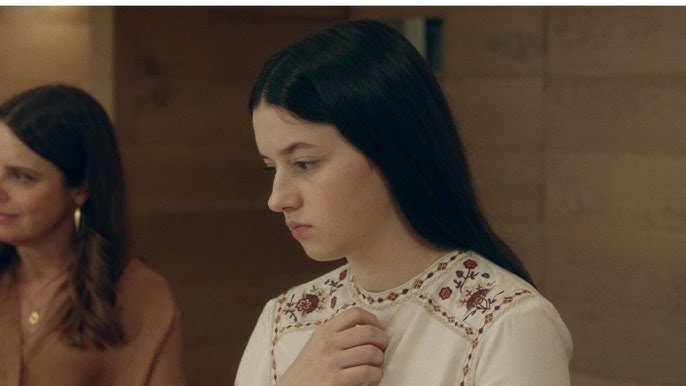Sundays
Los domingos
VERDICT: The life of a middle-class Spanish family is turned upside down when the 17-year-old daughter considers becoming a cloistered nun in Alauda Ruiz de Azua’s sly, funny and frequently moving ‘Sundays’.
One of the discoveries in this year’s eclectic San Sebastian festival competition is director Alauda Ruiz de Azua’s engaging family drama Sundays (Los domingos), based on her own clever screenplay which dips in and out of dramedy until its bittersweet yet satisfying conclusion. The dilemma of a bright, college-bound girl who feels the call of a religious vocation is treated seriously and respectfully by the filmmaker — though often flippantly by her dismissive family, who tend to be Catholics in name only.
But whatever side of the aisle the audience is on, they will find themselves cheering for the heroine Ainara as she goes through a life-changing decision process with no help from her loved ones. With its curious subject and skilled handling, the film should easily make the festival-to-theaters and TV crossover, with a shot at international markets.
While much of the film unfolds through conventional camerawork and the humorous realism of family tussles, misbehaving kids and the embarrassment of teenage hormones, the story always comes back to a deeper dimension. This is evident in the inspired choice of Blanca Soroa in the leading role. She has the calm, pensive face of a teenage Madonna and a soulful depth to match. Yet she is just an ordinary girl caught up in family turmoil over her potential decision to leave them for a lifetime behind convent bars (though in modern times the rules governing cloistered life have relaxed a bit, we are told.)
Ainara lost her mother at a young age and has been raised by her somewhat distant businessman father (Miguel Garcés), who now has a new family. A restaurant owner, he confesses over dinner that he has just spent 310,000 euros to renovate the place, much to his sister Maite’s horror (Patricia López Arnaiz). Their interwoven finances are one of the film’s weak points, as it is unclear who inherits what from whom in the event of Granny Lila’s death – or maybe the confusion is deliberate.
In any case, aunt Maite is a powerful, domineering figure in Ainara’s life, and the chief opponent to letting the girl go to the convent for a period of testing and “discernment”. The intensity of their confrontation is painful as Maite pushes her dissent with madly gleaming eyes, and Ainara is backed into a corner and uncomfortable when all her answers to her aunt’s challenges fall on deaf ears. The lack of harmony extends to Maite’s unmotivated dissatisfaction with her laid-back husband (and father of her son). Though he seems incapable of fighting her, it’s clear they are drifting apart.
Bringing family tensions to a head is the accidental discovery of Blanca and Mikel, a boy she likes, in bed kissing. This time it’s Dad who gets upset, while Maite gloats and weaponizes the incident to use against Ainara during an interview with the Prioress. The adroit directing manages to bring some notes of humor into what is otherwise an ugly, hurtful scene.
The cast is highly professional throughout, but not all the characters work as perfectly as the family members – the nuns, young priest and some of Ainara’s school friends feel a bit too obvious to click into place.
What does work spectacularly is the use of music, a thrilling chorus of young voices that sounds heavenly, even though the source – a school choir where Ainara meets temptation in the form of Mikel – is quite earthy. There are numerous choral arrangements produced by David Cerrejon, known for his collaborations with Alberto Iglesias, along with an astutely inserted “Into My Arms” by Nick Cave. Each time the audience starts getting caught up in the flow, the music abruptly cuts off. Only after Ainara reaches her decision, after an intense scene at her grandmother’s funeral, does the music continue to its conclusion over the end credits. It is a unique and beautiful way to express the ineffable.
Director, screenwriter: Alauda Ruiz de Azua
Producers: Marisa Fernandez Armenteros, Sandra Hermide, Manu Calvo, Nahikari Ipina, Guillermo Farré, Fran Araujo
Cast: Blanca Soroa, Patricia López Arnaiz, Miguel Garcés, Juan Minujín, Mabel Rivera, Nagore Aranburu
Cinematography: Bet Rourich
Production design: Zaloa Ziluaga
Costume design: Ana Martinez Fesser
Editing: Andrés Gil
Music: David Cerrejon
Sound: Andrea Sáenz Pereiro, Mayte Cabrera
Production companies: Buenapinta Media, Colosé Producciones, Encanta Films, Sayaka Producciones, Think Studio, Los Desencuentros Pelicula, Telefonica Audiovisual Digital
World sales: El Pacte
Venue: San Sebastian Film Festival (Competition)
In Spanish
115 minutes

